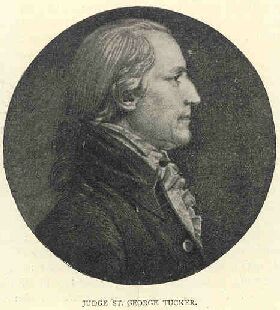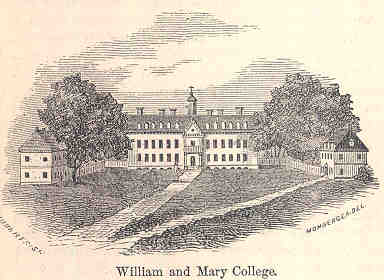|
St.
George Tucker
Susan P. Lee, John Randolph
Tucker [Identified in Mary Haldane Coleman, St. George Tucker: Citizen of No Mean City (Richmond, Virginia: The Dietz Press, 1938) as a St. Memin engraving made in 1807] St. George Tucker was a lawyer, trader, inventor, scholar, professor, judge, essayist, poet, avid gardener, and amateur astronomer. Tucker was born in Bermuda, on July 10, 1752. The Tucker's migrated to Bermuda from England and established themselves on the island in the mid-1600s. With a substantial population of slaves, there was little work for established families and St. George Tucker, the youngest of four sons (there were also two daughters) would begin the study of law in Bermuda but left in 1771 at age nineteen to finish his studies at the College of William and Mary.
Evert A. & George L. Duyckinck,
The Cyclopedia of American Literature 87 In Williamsburg he took up general studies for six months or so and then signed on to read law under George Wythe, who had been a teacher of Thomas Jefferson. He graduated from William and Mary in 1772, and was admitted to the bar in 1774. He practiced law briefly but with the Revolutionary War in its early stages, the Virginia courts were closed and Tucker returned to Bermuda in 1776. When he returned to Virginia in January, 1777 he took up residence and law practice in Williamsburg, Virginia. In 1778 he married the widow of John Randolph, Francis Bland Randolph, and became the father of three in doing so. After his marriage he moved to the Randolph plantation near Petersburg. During the war, Tucker joined the militia as a major and served as a major, and participated in an engagement at Guilford Courthouse. After the war Tucker reestablished his law practice at Petersburg and became a judge on the general court of Virginia in 1788, the year his wife died after giving birth to their sixth child. In 1791 he remarried, this time a widow with two children. Three children of this marriage all died in their early years. Tucker assumed a professorship of law at the College of William and Mary in 1800, was appointed as a justice of the Supreme Court of Virginia in 1803, where he served until 1811. The year of his appointment to the Virginia high court, also saw publication of his edition of Blackstone's Commentaries. In 1804 he gave up his law faculty appointment for another judicial appointment, and in 1813 became a U.S. District Court judge by appointment of President James Madison, a position he held until 1825. Tucker wrote poetry, political satire, tried his hand at drama, but is known best for his edition of Blackstone's Commentaries and his other legal commentaries, including View of the Constitution, one of the first extended commentaries on the newly ratified Constitution. He is sometimes referred to as the "American Blackstone" for his Americanized version of a multi-volume of Blackstone's Commentaries on the Laws of England. Tucker died in November, 1827, at the age of seventy-five. The following comment on Tucker can be found in Rufus Wilmot Griswold, The Poets and Poetry of America 40 (New York: James Miller, Publisher, 1872):
The Tucker family produced a long line of jurists and scholars, including St. George Tucker's sons, Henry St. George Tucker (1780-1848) and Nathaniel Beverley, and a grandson, John Randolph Tucker (1823-1897), all lawyers, and Nathaniel and John Randolph poets as well. St. George Tucker St. George Tucker A
Concise History of the Marshall-Wythe Law Library
Poems Days of My Youth
[Source: Rufus Wilmot Griswold, The
Poets and Poetry of America 40 (New York: James Miller,
Publisher, 1872)(with punctuation corrections)] ["Resignation:
Or, Days of My Youth"] [Rufus
Wilmot Griswold] ["Days
of My Youth"]
St. George Tucker, Liberty, a Poem; On the Independence of America (Richmond: Printed by Aug. Davis, 1788)(20 pgs.) ______________, The Probationary Odes of Jonathan Pindar, Esq. a Cousin of Peter's and Candidate for the post of Poet Laureat to the C.U.S. (Philadelphia: Printed for Benj. Franklin Bache, 1796) ______________, The Poems of St. George Tucker of Williamsburg, Virginia, 1752 -1827 (New York: Vantage Press, 1977)(William S. Prince ed.) Writings St. George Tucker, Dissertation on Slavery: With a Proposal for Its Gradual Abolition of It in the State of Virginia (Philadelphia: Mathew Carey,1796)(New York: [s.n.], 1861)(Westport, Connecticut: Negro Universities Press, 1970) ______________, Letters on the Alien and Sedition Laws (1799) ______________, Blackstone's Commentaries: With Notes of Reference to the Constitution and Laws of the Federal Government of the United States and of the Commonwealth of Virginia (Philadelphia: W.Y. Birch and A. Small, 1803)(5 vols.)(Union, New Jersey: Lawbook Exchange, 1996)(5 vols.) [St. George Tucker on Rights of Conscience and Freedom of Speech and Press [online excerpt from Tucker's Blacktsone's Commentaries] ______________, The Old Bachelor (Richmond, Virginia: Printed at the Enquirer Press, for Thomas Ritchie & Fielding Lucas, 1814)(2nd ed. 1814)(Baltimore: Published by Fielding Lucas, jun. J. Robinson, printer, 1818)(2 vols.) ______________, Hansford: A Tale of Bacon's Rebellion (Richmond, Virginia: George M. West, 1857) ______________, View of the Constitution of the United States: With Selected Writings (Indianapolis: Liberty Fund, 1999)(foreword by Clyde N. Wilson) ______________, Of the Right of Conscience; and of the Freedom of Speech and of the Press [online text] Bibliography Mary Haldane Coleman, St. George Tucker: Citizen of No Mean City (Richmond, Virgina: Dietz, 1938) Charles T. Cullen, St. George Tucker and Law in Virginia, 1772-1804 (New York: Garland Publishing, 1987) Bibliography: Dissertations Claudia Lamm Wood, " 'With Unalterable Tenderness:' The Courtship and Marriage of St. George Tucker and Frances Randolph Tucker," Master's Thesis, College of William and Mary, 1988 Robert M. Scott, "St. George Tucker and the Development of American Culture in Early Federal Virginia 1790-1824," dissertation, George Washington University, 1990 (Examination of Tucker's relationship to the culture of federal Virginia drawing on his poems, essays, and plays and his identification with Jeffersonian republicanism and the republican ideal. The study draws on Tucker's manuscript letters, journal, notebooks, case reports, and law practice notes in the Tucker-Coleman Collection at the University of William and Mary) Bibliography: Articles & Bibliographies William S. Osborne, "St. George Tucker," in Louis D. Rubin, Jr. (ed.), A Bibliographical Guide to the Study of Southern Literature 315 (Baton Rouge, Louisiana State University Press, 1969) William S. Prince, St. George Tucker: Bard on the Bench, 84 (3) Virginia Magazine of History and Biography 267-282 (1976) Robert L. Scribner, "Fort St. George" [Home of St. George Tucker], 5 (2) Virginia Cavalcade 21 (Autumn 1955) St. George Tucker, in William Peterfied Trent (ed.), Southern Writers: Selections in Prose and Verse 60-62 (New York: MacMillian Co., 1905) Research Resources Tucker-Coleman
Papers Research Resources: George Whyte George Wythe: Signer of the Declaration of Independence George Wythe: Writings and Biography George
Whyte's Burial Site Robert Bevier Kirtland, George Wythe: Lawyer, Revolutionary, Judge (Ann Arbor: University Microfilms International, 1985) |

